Northern Arizona University Research and Mentoring for Postbaccalaureates (RaMP)
The Research and Mentoring for Postbaccalaureates (RaMP) program at Northern Arizona University (NAU) seeks to advance Indigenous perspectives to address climate vulnerability in the Southwest through research training for and by diverse communities. The RaMP program is an intensive year-long research experience designed to train and connect recent college graduates, particularly Indigenous and Latinx participants, with research careers supporting improved ecosystem health within their own communities. Northern Arizona University’s program is funded by the National Science Foundation’s Research and Mentoring for Postbaccalaureates in Biological Sciences.
RaMP scholars will be selected based on the following criteria:
- Interest in a career in biology or natural resource management,
- Limited opportunity for participation in research, post-degree technical training, or other educational opportunities. Limitations could be the result of many factors including: attendance at a Tribal or community college, finances, health, family, geographic location, or the COVID pandemic.
- Alignment of participant interests with research themes and the expertise of mentors (described below),
- Overall academic potential.
RaMP scholars will work closely with mentors to design and implement research projects focused on helping to mitigate or prevent the damaging effects of climate change on southwestern landscapes. Our long-term goal is to help you be part of a diverse and skilled workforce capable of responding to our unique regional challenges in climate and resources. Research projects will be co-produced by science faculty, Indigenous leaders, land managers, and fellows. This program aims to prepare participants for jobs or additional graduate education in these areas.
The program offers each participants the following benefits:
- $42,500 one-year stipend to cover living expenses;
- NAU group health insurance (single);
- a laptop budget; and
- travel expenses for field research, conferences, and workshops.
Read more about the program and its goals in an NAU News story.
Program elements
The RaMP program kicks off with a 3-day retreat and orientation program at the nearby Merriam Powell Research Station, located in the Coconino National Forest 5 miles from campus. At the retreat, participants will create an individual plan to develop their scientific identities over the course of the next year while getting to know other program participants, mentors, and staff.
Following orientation, participants will finalize their roles in a research group through conversations with mentors and program staff. Participants will work full time on research projects with mentor and team input and weekly meetings. Support and training will be tailored to the background, needs, and goals of individual participants to ensure they are competitive for the next step in their career, whether that is to directly enter the environmental biology workforce or to continue training in graduate school. Individual research programs will be supplemented through multiple field trips and an annual workshop to learn scientific principles, hear about climate change impacts from Tribal and network partners, and meet potential employers.
RaMP participants will meet weekly with program staff to grow their skills through discussions, tutorials, guest lectures, and written and oral communication practice sessions. Topical areas will include: (1) ecological concepts related to climate adaptation and conservation; (2) ecological history, traditional ecological knowledge, and climate justice; (3) conduct and design of research; (4) field and lab safety; (5) responsible conduct of research; (6) formal and informal written and oral communication and interpretation of scientific literature; (7) professional skills, career pathways, and identity; (8) teamwork and leadership; and 9) quantitative skills, data collection, and data management.
Participants will present research findings and participate in culturally responsive professional development at conferences such as the National Diversity in STEM Conference run by SACNAS and the American Indian Science and Engineering Conference. We will also host an Annual Research Symposium at NAU for fellows to share their research with NAU faculty and fellows, as well as all co-mentors, network partners, collaborators, and family members. This annual celebration will offer fellows an opportunity to share what they have learned with all stakeholders and their families.
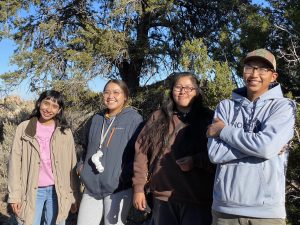
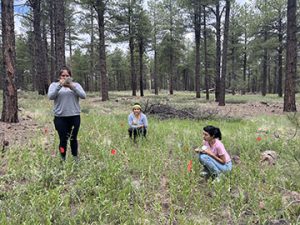
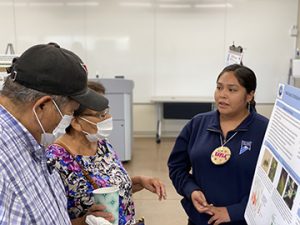
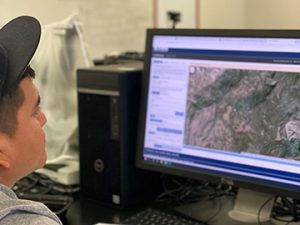
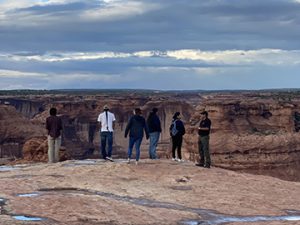
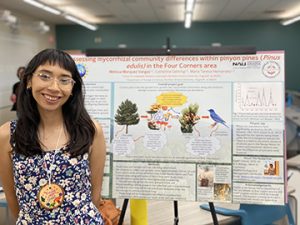
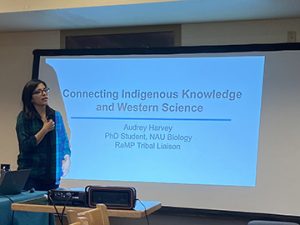
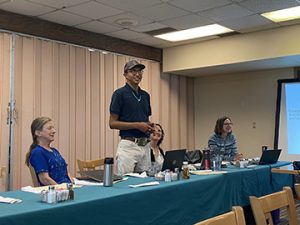
Research groups
Pinyon pine is one of two tree species defining the habitat of dry southwestern forests and is projected to disappear from broad swaths of its range under climate change. Collaborators at Navajo Technical University have noted increasing loss of pinyon pine to drought and to increases in fuelwood cutting with the closure of a local coal mine. Loss of pine nut harvest is of concern to many tribes in the region, and the NPS is also concerned about climate change impacts and restoration after fire. Finally, there is growing concern in the US Forest Service and Great Basin Bird Observatory over decline in pinyon jay population.
Research questions to aid climate change mitigation in pinyon-juniper ecosystems may include:
- How important is genetic diversity for maintaining populations through unprecedented disturbance?
- What are the patterns of current and predicted loss of pinyon pine on tribal lands?
- How can soil microorganisms and biocrusts enhance re-establishment after catastrophic fire?
- What are the impacts of pinyon decline on pinyon jays?
This research area will include opportunities for field monitoring, lab work, genetics, and mapping involving plants, microbes, insects, and pinyon jays.
Emory oak is one of two dominant oaks species in central Arizona and a cultural keystone species for western Apache Tribes. Emory oak acorns are a first food for western Apache people and integrated into nearly all Apache ceremonies. Climate change, fire suppression, and introduction of domesticated livestock degraded Emory oak habitat, leading tribal elders to express concern over the future of southwestern Emory oak populations. This led to the creation of the Emory Oak Collaborative Tribal Restoration Initiative (E-OCTRI), a collaboration of four Tribal Nations, researchers, private industry, and the US Forest Service and overseen by a tribal elder steering committee. The goal of this initiative is to ensure resilience of Emory oak stands under climate change and other environmental stressors and promote viable oak populations to sustain acorn harvest for future generations of Apache people.
In the first year of RAMP, we will investigate questions about the condition of Emory oak populations aligned with interests of the Emory oak elder steering committee:
- How do environmental conditions (eg. Fire, herbivory and precipitation) affect Emory oak reproduction, acorn germination and seedling survival, and seedling recruitment?
We will develop fundamental knowledge on Emory oak acorn dispersal, habitat requirements, and range wide growth, survival, and disease dynamics. Fellows will employ ecological survey techniques, vegetation identification skills, and capacity related to sampling design and essential Geographic Information Systems (GIS) skills. This pod provides a tool kit to understand fundamental ecological concepts, interpret ecological research and reports, develop, and implement comprehensive monitoring plans for natural resource management, and generate recovery and management strategies for species of concern.
Grazing, climate change, and invasive plants are interacting threats to dryland ecosystems of the southwest. Using biocrusts and soil organisms to stabilize soils and return ecosystem functions and restore native plant communities and fire cycles are of key interest across all stakeholders, including tribal and federal agencies, NGOs, and businesses, and have been areas of rapid research expansion. Integrating Indigenous knowledge of pre-colonial landscapes and functions is a new and critical area where we will expand to guide management planning and restoration efforts, incorporating collaboration from stakeholder groups such as the Collaborative Forest Landscape Restoration Program (CFLRP) and Trees Water, People on the Jemez District in New Mexico forested lands, and BLM, TNC, NPS and USGS partnerships in rangeland and desert ecosystems in Arizona, Utah, Nevada and California. In addition to the grasses and biocrusts in these ecosystem, numerous other plants traditionally used by Indigenous and local populations for food, dye, medicine, fiber or ceremonial uses are affected by changing climate. Since Native American Reservations represent a fraction of the territory once inhabited by tribes, access to populations of traditional use plants on public lands is imperative to the continuation of cultural practices. Nine Tribal Nations, in collaboration with the USFS, are coming together to collect data on select plants using citizen science to support traditional harvest and improve management of these species.
Participants in this research group will work to assess the effectiveness of management actions, such as grazing and fire management and ‘seeding’ of biocrust, grasses, and forbs to promote ecosystem health and sustainability.
Research questions to aid conservation and management of drylands might include the following:
- How do climate change, fire and/or grazing pressures interact to affect plant and soil community stability and health?
- Does restoration of soil communities lead to development of soil stability and native plant communities?
- Can we restore dryland communities for climate and land use sustainability?
- Is there a grazing level that is compatible with soil and plant community health and stability?
Fellows in this group will gain experience in field, laboratory, and greenhouse studies, learning tools including survey methods, experimental design, soil organism and plant identification, microscopy, GIS, etc.
Springs, rivers, and ponds provide water for humans, livestock, and wildlife and also support aquatic species from vegetation to invertebrates and amphibians. These aquatic ecosystems represent a small but essential part of the dry southwestern landscape, and can be heavily impacted by both land use and climate change. Projects in this group seek to support Tribal and Federal agencies working to monitor and restore these ecosystems. Projects may focus on the health of aquatic and riparian ecosystems across the landscape, or strategies for restoring biodiversity in particular sites.
Research questions to aid conservation of aquatic and riparian ecosystems:
- How are land management and climate change affecting the quality and availability of aquatic habitats?
- Which riparian plants will continue to thrive and support their ecosystems in hotter and drier conditions?
- Can restoring riparian and aquatic vegetation help us conserve a diverse community of aquatic invertebrates and amphibians?
Fellows in this group may gain experience with field surveys, laboratory or greenhouse experiments, microscope and/or DNA-based identification of animal diversity, and/or remote sensing and GIS analysis, depending on the project. All fellows will learn how to take a research project from design of data collection through data analysis to interpretation and presentation of results.
Program dates and application deadline
Thank you for your interest in applying to NAU’s RaMP postbaccalaureate training program! Please review the application requirements below and submit your completed application no later than January 22, 2024 . The program will begin June 10, 2024 (participants should arrive by June 9), and run through June 9, 2025.
Documents required include an unofficial transcript, two letters of recommendation (by email to Anita.Antoninka@nau.edu), and a short statement of interest.
Please note that you can pause progress and continue your application as needed. The form will save your progress. However, we encourage you to prepare all documents ahead of working in the form.
Apply now
Contacts
The following people are available to answer questions about the program and application process. They are happy to help you and you are encouraged to contact them.
Phone: 928.523.8727
Phone: 928.523.2669